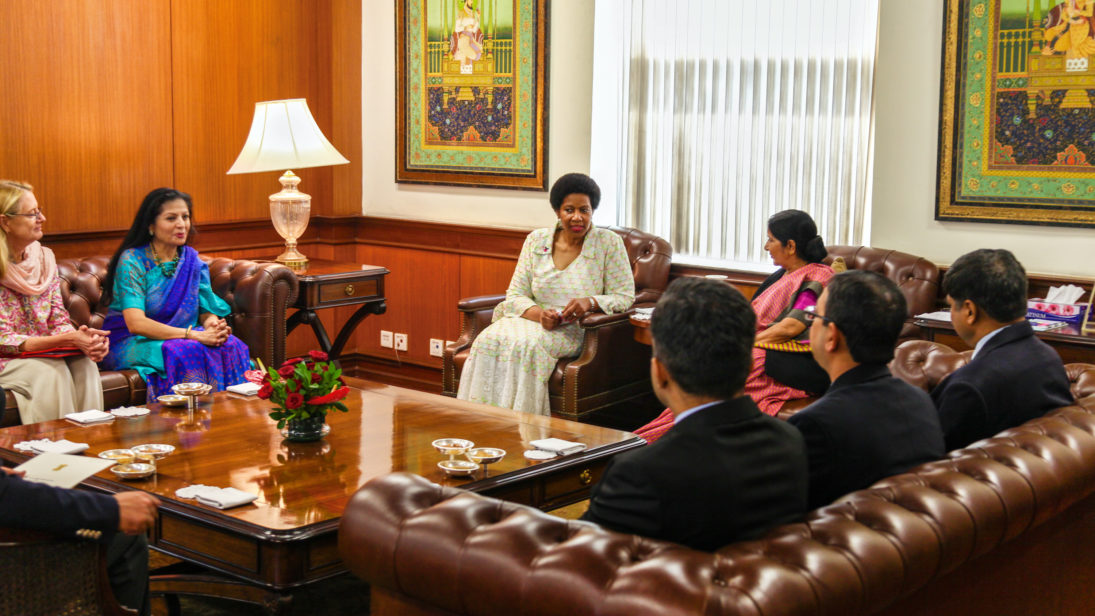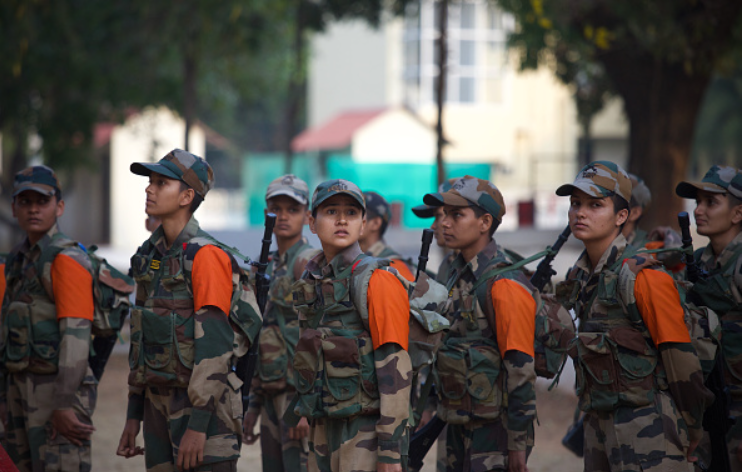
Two decades have passed since the United Nations Security Council (UNSC) adopted its Women, Peace, and Security (WPS) agenda, which calls for the participation of women in peace and security matters, protection and promotion of women’s rights, and integration of female needs in relief and recovery efforts. Despite India’s international support for this agenda, women within India’s socio-political landscape continue to fight for agency and leadership. This is as they constantly confront risks of marginalization and vulnerability in the face of deeply embedded patriarchal norms, gender-based violence, and prolonged institutional discrimination.
Meanwhile, India continues to experience internal conflicts and cases of militarization: armed forces have been deployed in Jammu and Kashmir, Chhattisgarh, Assam, and elsewhere. Successive Indian governments have nonetheless maintained that there are no armed conflicts within India’s geographical boundaries and that the WPS agenda is not applicable to the internal Indian context. Emerging research suggests that the combination of patriarchal norms and conflicts often exacerbate pre-existing gender inequalities. India has borne witness to some of the most egregious crimes against women, experienced significant political upheaval, and all the while continued to deny women adequate representation in peace and security matters. To respond to these challenges, India must apply the WPS agenda in its domestic sphere—in both conflict or non-conflict zones—to ensure better outcomes for women and for peace. The WPS can help by improving conditions for women, limiting the impact of internal conflict on women, and increasing female representation in political bodies.
The WPS can help by improving conditions for women, limiting the impact of internal conflict on women, and increasing female representation in political bodies.
India’s Position on WPS
India has actively participated in the UNSC open debates on WPS, repeatedly making strong institutional statements concerning the protection of women’s human rights and prevention of violence against women. For instance, at the 2009 UNSC open debate on WPS, Hardeep Singh Puri (then India’s Permanent Representative at the UN), highlighted that “India has consistently held that greater participation of women in areas of conflict prevention, peace negotiations, peace keeping and post conflict reconstruction is the sine qua non for lasting peace and security.” In this sense, Indian diplomats and political leaders have committed—at least in rhetoric—to the effective operationalization of the WPS agenda. India has supported its words with some action in the international arena. Under its WPS obligations, India deployed an all-female police unit to assist a peacekeeping mission in Liberia in 2007, a female engagement team to the Democratic Republic of Congo in 2019, and an all-female police unit to South Sudan in 2019. However, India’s statements and actions internationally vis-á-vis the WPS agenda have largely failed the test of practice within its domestic context, especially in internal conflict scenarios.
The Indian government has disassociated itself from the implementation of the WPS resolutions domestically largely because it does not recognize the presence of any armed conflicts within its territory. In fact, India categorizes the conflict zones of Jammu and Kashmir only as “disturbed areas” despite heavy militarization. Implementing the WPS could significantly improve the security of women within its domestic context—both in conflict zones and otherwise.
Why is WPS relevant for India?
The WPS agenda covers a myriad of issues affecting women and presents several opportunities for greater empowerment, such as advancing their participation, ensuring meaningful inclusion, and protecting their rights. By applying the WPS agenda domestically, India can improve outcomes for women and establish pathways to building long-lasting peace by including female representatives as equivalent partners in peace and security matters. Decreasing the barriers that obstruct women’s quantitative and qualitative participation, application of the WPS agenda within India would be a step forward in dismantling the patriarchal cultural values that dictate behaviors in domestic institutions.
The WPS agenda can serve as a significant tool for improving the gender balance in Indian political bodies and regional security forums. Women currently comprise only 14.4 percent of the Lok Sabha and just over 10 percent of the Rajya Sabha, despite constituting 48.5 percent of the population. Women are vastly underrepresented at security discussions. For example, during the formal peace negotiation between Assam’s armed militant group and the government of India, there was only one woman participant.

This perpetual paucity of women’s voices in the upper echelons of decision-making has offset India’s progress, as sustainable development and lasting peace are not possible without female perspectives. As a result, the predominant masculinized discourse of security in India has prioritized military issues over non-traditional security challenges, which has hampered opportunities for peaceful conflict resolution. Academics have increasingly argued that participation of women as well as civil society organization makes a peace agreement and negotiations 64 percent less likely to fail.
India’s rhetorical claims vis-á-vis WPS issues can only be effective if it rectifies gender inequality at home. The four pillars of the agenda can help India achieve this goal. The WPS and its subsequent resolutions are based on four priority pillars, including the participation, prevention, protection, and relief and recovery efforts. Weaving these principles into India’s existing framework will help decision-makers devise gender-sensitive and inclusive policies. These must be mindful of the needs, concerns, and interests of women. In this regard, the integration of the WPS agenda could steer India’s course of action towards increasing the work on gender integration and mainstreaming within Indian sectors, particularly the male-dominated defense and security sectors.
In addition, the WPS agenda could mitigate the effects of internal conflict in India on women by providing them with legislative and judicial mechanisms for protecting their rights. Almost one-sixth of India is undergoing some form of armed conflict or insurgency today. Militarization occurs in various parts of India. And, for women, “militarization”—where the warring parties are state and non-state actors—can be just as traumatizing as situations of armed conflict—where warring parties are often non-state actors exclusively. State involvement reinforces the culture of impunity for rape at the hands of both the militants and the state actors. Militarization also supports patriarchal moral policing of women’s bodies and behavior, limiting their mobility, access to education, and livelihoods. The WPS agenda—which seeks to protect women and acknowledge their agency—is significant even where militarization has made gender-based violence endemic.
In light of increasing atrocities against women in the region, it is high time India’s internal policies match its rhetorical commitments regarding WPS to open a space for women to engage at the top-most levels and fight for better peace and women’s rights.
Adopting the WPS Agenda
India’s failure to advance the values of the agenda in its domestic realm largely stems from the government’s reluctance to transplant universal norms into the national context. This is part of its veneer of protecting and upholding the sovereignty and non-interference in its domestic affairs. Another challenge in this regard is the fragmented perception that women’s inclusion into policy-making process will focus more on “soft security issues” at the expense of important hard security matters.
What this misses is that the WPS agenda makes the pursuit of gender-equality relevant to every single Indian government action and provides tools for critical engagement with and ultimately dismantling of deeply rooted patriarchal notions. Successfully adopting the agenda could lead India to increase women’s participation in decision-making, provide protection to women and ensure their role in relief and recovery efforts.
In light of increasing atrocities against women in the region, it is high time India’s internal policies match its rhetorical commitments regarding WPS to open a space for women to engage at the top-most levels and fight for better peace and women’s rights.
***
Image 1: UN Women/Gaganjit Singh via Flickr
Image 2: Abhishek Chinnappa via Getty Images


